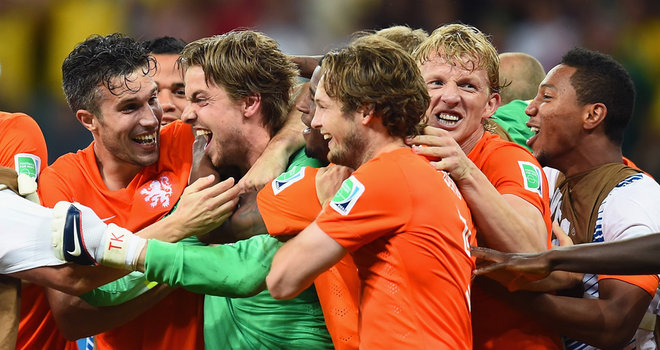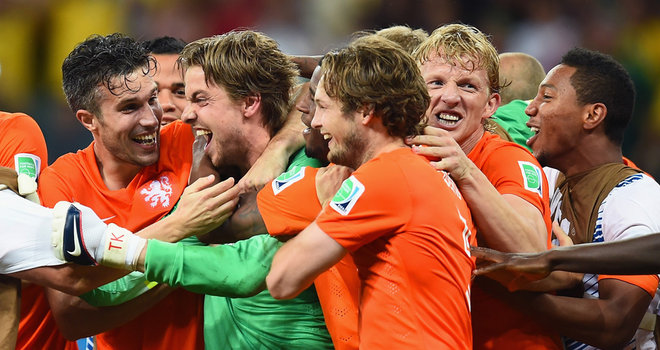Did you watch the 7-1 can of whoop-ass that Germany opened in Brazil’s home field? I may not be able to predict much about the second semifinal between Argentina and the Netherlands but I will give you a money-back guarantee (luckily this site is free) that it will be closer than the first one. What’s at stake is a place in the final game versus Germany. If Argentina wins, hope for the streak of South American World Cups being won by South American teams is still alive. The only thing worse for the Brazilian fans than seeing their team lose 7-1 might be seeing neighbor and rival Argentina win. If the Netherlands win, it would create a matchup between one of the most heated set of rivals in history. For perspective, in his excellent book, Brilliant Orange, the Neurotic Genius of Dutch Soccer, David Winner writes this about the World Cup finals in 1973 which the Netherlands lost to Germany:
The events of Munich, July 7, 1974 are burnt into the Dutch soul the way Dallas, November 22, 1963 haunts America. It may be obscene to suggest any precise equivalence between the horrific murder of President Kennedy and the losing of a mere football match; yet all over Holland grown men wept the day the Dutch lost the World Cup final to their neighbors. A TV poll conducted on the twentieth anniversary of the episode revealed that every sentient Dutch person recalled precisely where they were and what they were doing. Playwright Johan Timmers studied the calamity and its aftermath and concluded: “The defeat of 1974 is the biggest trauma that happened to Holland in the twentieth century, apart from the floods of 1953 and World War Two.”
So, there’s that. Either way, the fans win with a culminating contest between Europe and South America over world domination, or a rematch with deep, deep historic and psychological intrigue. Before all that though, there’s a semifinal to be played.
Argentina vs. the Netherlands, Wednesday, July 9, 4 p.m. on ESPN

Argentina looked great in their quarterfinal matchup against Belgium. Even though they only scored one goal, I thought they looked quick and decisive on the attack. Belgium, as we United States soccer fans now know, is no joke on defense. The Argentinians also looked stout on defense, particularly in holding off a desperate late Belgian surge. Argentina is led by a diminutive star midfielder, Lionel Messi. Messi plays fearlessly and far more often than should be possible for someone his size, shrugs off hard tackles to keep running towards goal. His talents are going to be tried more than ever in this game because his midfield partner, Angel Di Maria, will likely miss the game with a thigh injury. The Dutch have been known to play “cynically” or “pragmatically,” both terms that mean, “with a willingness to kick, trip, and bully an opponent star player into submission,” so Messi may be in for a rough day.
The Dutch team is an historic enigma but a relatively straightforward story if viewed without context. These days they are a solid team with good defenders, tireless midfielders, and a pair of clever and skilled strikers, Arjen Robben and Robin van Persie. What’s weird about that is that for generations, the Dutch have played soccer differently. Starting in the late 1960s and coming to its apex behind star Johann Cruyff in the 1970s, the Dutch played a brand of soccer called “Total Football” that emphasized a free flow of players who would interchangeably take up each other’s positions depending on the context of the game. This ideal was so powerful that it remained, altered but lodged in Dutch tactics until their current manager, Louis van Gaal, changed things. Grantland’s Mike L. Goodman writes about this transformation:
Before Van Gaal, the Netherlands played a 4-3-3. That wasn’t a choice, it was an immutable fact of nature. Death, taxes, and the Oranje play a beautiful, interchanging, possession-based 4-3-3.
Van Gaal looked at all that history, took it out back, and put it out of its misery. He sold his team on an idea of playing defensively and directly, no matter what critics back home might think. Speed and man-marking suited this particular group, not possession and positional interplay. Imbuing a side with an “us against the world” mentality is nothing new. Doing it when the world is, in this case, your own fans and history — well, that’s something else entirely.
It’s a hard choice to go against decades of history but van Gaal seems to enjoy making tough and controversial decisions, like he did in the Quarterfinals against Costa Rica when he substituted goalies for the shoot-out. That choice worked. What choices will van Gaal make in this game against Argentina? It’s almost time to find out. Enjoy the game!
— — —
To celebrate the World Cup in Brazil, Dear Sports Fan is publishing a set of posts explaining elements of soccer. We hope you enjoy posts like Why do People Like Soccer? How Does the World Cup Work? Why Do Soccer Players Dive so Much? What is a Penalty Kick in Soccer? What are Red and Yellow Cards in Soccer?, Why do World Cup Soccer Players Blame the Ball? and Reflections on the 2014 World Cup for the United States. The 2014 World Cup in Brazil begins on June 12 and ends on July 13.

